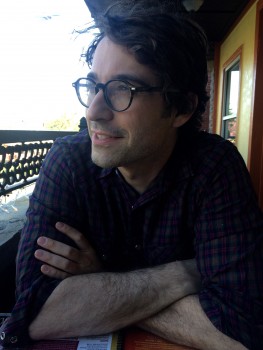
Herewith, poems from Peter Mishler, introduced to me by Emily Pulfer-Terino. Very cunning, deft and graceful poems. In “Demolition” a chance detour (on his way to work) leads the poet by an Econo Lodge which becomes a screen for his imagination and the stage for a dark, alienated story (words like “gurney” and “wrist” implicate the scene with dread). A week later, the detour signs disappear and the poet metaphorically wakes, sort of, from the dream of his imagination. It’s an ancient, haunting plot. Some tiny change in the humdrum routine of the world thrusts the dreamer into another world of darkness and disorder. Then he returns, not himself any longer, but changed. (Think: Hawthorne’s “Young Goodman Brown” for example.) He finds the humdrum now inflected with dream (“I walk the darkened, sea-foam hallways”). The poem ends with a lovely whispering repetition (morning, morning), the owl-like assonance (who, whom), and a shade of doubt.
I walk the darkened, sea-foam hallways
to my desk—and when the people
that I pass say, Morning, I say,
Morning, too, so that I can’t
be certain who is waking whom.
dg
§
DEMOLITION
For a week a detour takes me
past the windows of an Econo Lodge.
I invent what’s on the other side
each morning, beginning
with what I know is there:
an absent clerk, an empty lobby
some dark green carpet
joined in places with duct tape.
I add a chair for myself to sit
and make the smaller arrangements:
a door to a bedroom closed
just enough to hide a figure inside;
open enough to reveal a bed
that looks like a gurney,
a wrist laying face up
on the sterile and steamed
white sheets. What am I
intending to have happen here?
Hard to tell if it’s my wrist
or someone else’s that’s meant
to emerge from that room.
I’m getting a feel for the lobby, though:
within days I learn to fix
a sugar drink from sweetener
packets and sink-water.
I place a styrofoam cupful
in front of the bedroom door
and watch for movement.
But by the end of the week,
the detour signs are pulled
and my car is directed
back to the highway,
granting me another view:
the demolished building
the city was shielding me from.
A crane now sifts through fragments
and debris, sorting them into one pile
or another. As it holds
each piece of metal to the air
to let it flicker for a moment,
for me it is lifting the door,
the bed, the sheets, the wrist,
and the cup that should now be filling
with an early sunlight on the floor
of the motel. I watch in the mirror
as each object hangs, then drops.
My car approaches my building, and work.
I walk the darkened, sea-foam hallways
to my desk—and when the people
that I pass say, Morning, I say,
Morning, too, so that I can’t
be certain who is waking whom.
PERIPHERY
You are evading me.
You are just beyond me.
You are the length
of the hood of a car
away from me—
and thinner
than I remember,
dressed as if undressed
after work.
I reach until
I can meet your hand.
But you are in front of me
like the moon
on one week,
then behind me
like the moon on another.
You are trying
to move toward
the doors of a church
we both know,
and I won’t let you.
I step in front of you
and you step to the side
saying, Stay
on the periphery
and we’ll be in touch
this summer.
But what’s here
that won’t let me
speak to you—
that prevents me
from letting you
go inside,
that makes you
want to go inside?
I tell myself, Yes,
I know I must
stay here and lie
whenever I try
to retell the story.
Once, two friends stood
on opposite banks
of a stream.
Then, they were men
and a river,
and then, two ghosts—
the story becoming
more distant
or strange
the more I fear
the person listening.
.
HARUSPEX
The office lights chose
to remain half-lit
for the rest of the fall.
I went whistling
the song of two crows
down a hall unknowingly.
Through my phone
an exam room
slipped into my ear
and unfolded
its expanses brightly.
How does one
get to sleep
in a city of snowfields?
My father sent me
an absentee ballot,
and asked did I think
my future was secure?
I day-dreamt throughout,
and my eyes flew doubly
over a man, on a raft,
down-river—
his body, thin;
his liver, a white star
pressed against his skin.
It asked me to extract it
for its portents.
Back in the office,
my xeroxes spilled
through a seam of light.
They handed me
a memory of warmth
from distant fires.
‘
CLOSED LOOP
You try again
to shut your eyes—
rejoin your head
and heart—
afraid of being
called back to the house
and broken from
your little spell.
But no one is home
to call you home.
Nobody stops you
from pausing
in the last days
of August
like you do.
You’ve stepped outside
some nights
and wanted
to get back in.
There were lists
to be made,
glasses of water
to shift from table
to nightstand.
Stay and let yourself
be known
from the vantage
of sky and window—
your body centered
in a sprawl of lawns
that narrows
away from you
into a vanishing point
of smaller
and smaller houses,
where younger
and younger children
sit behind glass
looking out
onto increasingly
darkened streets,
imagining
unreal figures
at play beneath them—
beginning here
where you stand.
From window
to window,
childhood’s rules
are passed above you
endlessly:
all a boy must do
is close his eyes
and you can disappear.
—Peter Mishler
———————
Peter Mishler’s poems have appeared in The Antioch Review, New Ohio Review, and Crazyhorse. He teaches Creative Writing and English at Liverpool High School in Central New York.